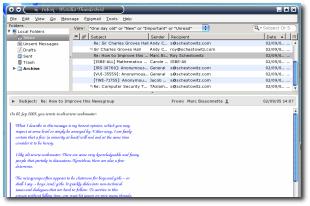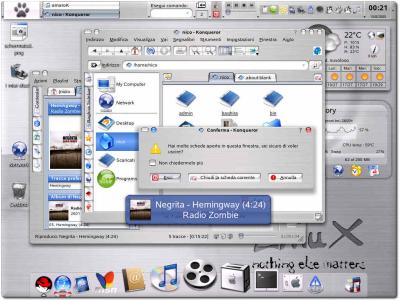
Upgrade to Thunderbird. It’s Open Source and it honours standards/netiquette.
 ICROSOFT Outlook is a terrible mail application, despite some common beliefs (and expectations due to cost, or bloat). I cannot comment on its abilities as a calendaring software as I have only seen others using these peripherals features. However, at least one Outlook user whom I exchange E-mails with is breaking every rule in the book regularly (if not always). Outlook does not prevent him from doing this. As a matter of fact, it encourages this and a dissatisfied recipient is of course less likely to reply.
ICROSOFT Outlook is a terrible mail application, despite some common beliefs (and expectations due to cost, or bloat). I cannot comment on its abilities as a calendaring software as I have only seen others using these peripherals features. However, at least one Outlook user whom I exchange E-mails with is breaking every rule in the book regularly (if not always). Outlook does not prevent him from doing this. As a matter of fact, it encourages this and a dissatisfied recipient is of course less likely to reply.
Here is a short description of the problems inherent in these messages that I receive from Outlook (and sometimes Outlook Express too):
- HTML-formatted
- Non-standard ‘HTML’ (Microsoft Office inclination, MSIE-centric)
- Roughly 38 kilobyte even for a one-liner (an enormous non-standards compliant ‘style sheet’ is prepended)
- 10-line signature (Outlook does not warn or deter)
- No signature delimiter (breaking all RFC standards)
- Always top-posted, not trimmed and lacking context (Outlook is definitely not helping by creating new lines and putting the cursor at the top)
- In quotes, re-wrapping is broken and irregular symbols get inserted sporadically
There is no gentle way to approach the issue, but one such person learned to at least stick to plain-text (owing to a kind request). The top posting habits remain though. Outlook Express requires QuoteFix, which is addon software/hack, just to stop this default behaviour and make bottom posting practical. So there is no subtle way to suggesting others to improve their posting habits, unfortunately. To them, the Windows/Microsoft way is the right way. Acceptable standards lose their value when a desktop monopoly simply ignores them.
Some time ago I wrote some notes on how to begin loving E-mail again , which reminds me of an old favourite that is titled the UseNet improvement project.







 Filed under:
Filed under:  have always said that I would never write blog content while drunk or even tipsy. I think I made the exception only once. Today I have a compelling reason to make an exception, too.
have always said that I would never write blog content while drunk or even tipsy. I think I made the exception only once. Today I have a compelling reason to make an exception, too.
 nice old writeup from Tristan Miller (someone whom I first met on UseNet) explains why it is a
nice old writeup from Tristan Miller (someone whom I first met on UseNet) explains why it is a  NE thing that keeps striking me as surprising is that people’s habits supersede all logic. I will provide an example from technology.
NE thing that keeps striking me as surprising is that people’s habits supersede all logic. I will provide an example from technology.


 ICROSOFT Outlook is a terrible mail application, despite some common beliefs (and expectations due to cost, or bloat). I cannot comment on its abilities as a calendaring software as I have only seen others using these peripherals features. However, at least one Outlook user whom I exchange E-mails with is breaking every rule in the book regularly (if not always). Outlook does not prevent him from doing this. As a matter of fact, it encourages this and a dissatisfied recipient is of course less likely to reply.
ICROSOFT Outlook is a terrible mail application, despite some common beliefs (and expectations due to cost, or bloat). I cannot comment on its abilities as a calendaring software as I have only seen others using these peripherals features. However, at least one Outlook user whom I exchange E-mails with is breaking every rule in the book regularly (if not always). Outlook does not prevent him from doing this. As a matter of fact, it encourages this and a dissatisfied recipient is of course less likely to reply.
 INUX can be assimilated to merely any desktop environment, including the appearance of its rivals’ desktops. It can endlessly adapt, particularly layout-wise, although look-and-feel is getting there too. Different interfaces (achievable through desktop environment), as well as various addons, make this truer than ever before. There are several design sets lying about, which enable Linux to look and behave merely like any other operating system. Here are a few examples that I collected recently:
INUX can be assimilated to merely any desktop environment, including the appearance of its rivals’ desktops. It can endlessly adapt, particularly layout-wise, although look-and-feel is getting there too. Different interfaces (achievable through desktop environment), as well as various addons, make this truer than ever before. There are several design sets lying about, which enable Linux to look and behave merely like any other operating system. Here are a few examples that I collected recently: